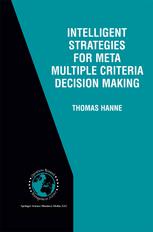

Most ebook files are in PDF format, so you can easily read them using various software such as Foxit Reader or directly on the Google Chrome browser.
Some ebook files are released by publishers in other formats such as .awz, .mobi, .epub, .fb2, etc. You may need to install specific software to read these formats on mobile/PC, such as Calibre.
Please read the tutorial at this link: https://ebookbell.com/faq
We offer FREE conversion to the popular formats you request; however, this may take some time. Therefore, right after payment, please email us, and we will try to provide the service as quickly as possible.
For some exceptional file formats or broken links (if any), please refrain from opening any disputes. Instead, email us first, and we will try to assist within a maximum of 6 hours.
EbookBell Team

0.0
0 reviewsMultiple criteria decision-making research has developed rapidly and has become a main area of research for dealing with complex decision problems which require the consideration of multiple objectives or criteria. Over the past twenty years, numerous multiple criterion decision methods have been developed which are able to solve such problems. However, the selection of an appropriate method to solve a particular decision problem is today's problem for a decision support researcher and decision-maker.
Intelligent Strategies for Meta Multiple Criteria Decision-Making deals centrally with the problem of the numerous MCDM methods that can be applied to a decision problem. The book refers to this as a `meta decision problem', and it is this problem that the book analyzes. The author provides two strategies to help the decision-makers select and design an appropriate approach to a complex decision problem. Either of these strategies can be designed into a decision support system itself. One strategy is to use machine learning to design an MCDM method. This is accomplished by applying intelligent techniques, namely neural networks as a structure for approximating functions and evolutionary algorithms as universal learning methods. The other strategy is based on solving the meta decision problem interactively by selecting or designing a method suitable to the specific problem, for example, the constructing of a method from building blocks. This strategy leads to a concept of MCDM networks. Examples of this approach for a decision support system explain the possibilities of applying the elaborated techniques and their mutual interplay. The techniques outlined in the book can be used by researchers, students, and industry practitioners to better model and select appropriate methods for solving complex, multi-objective decision problems.